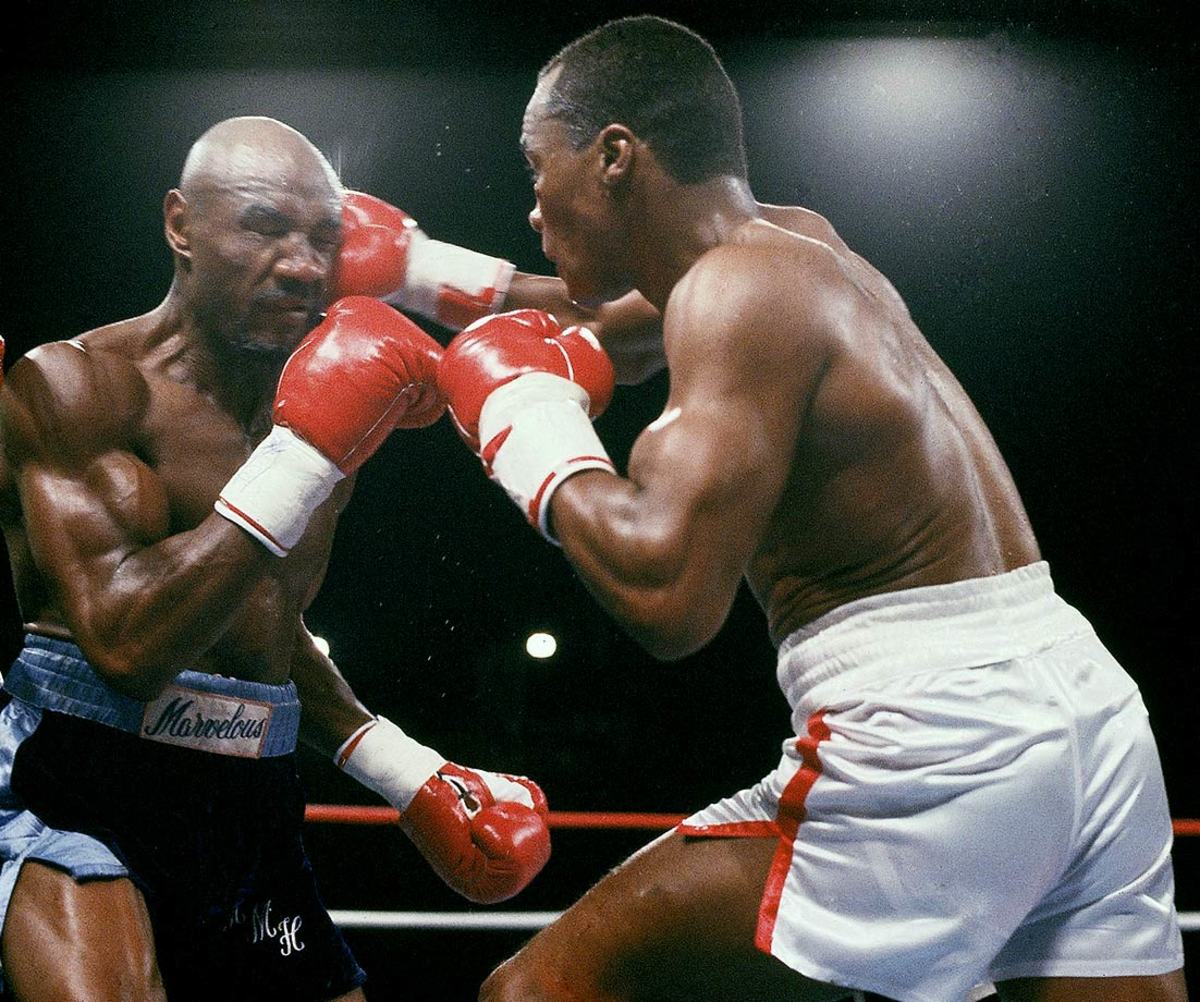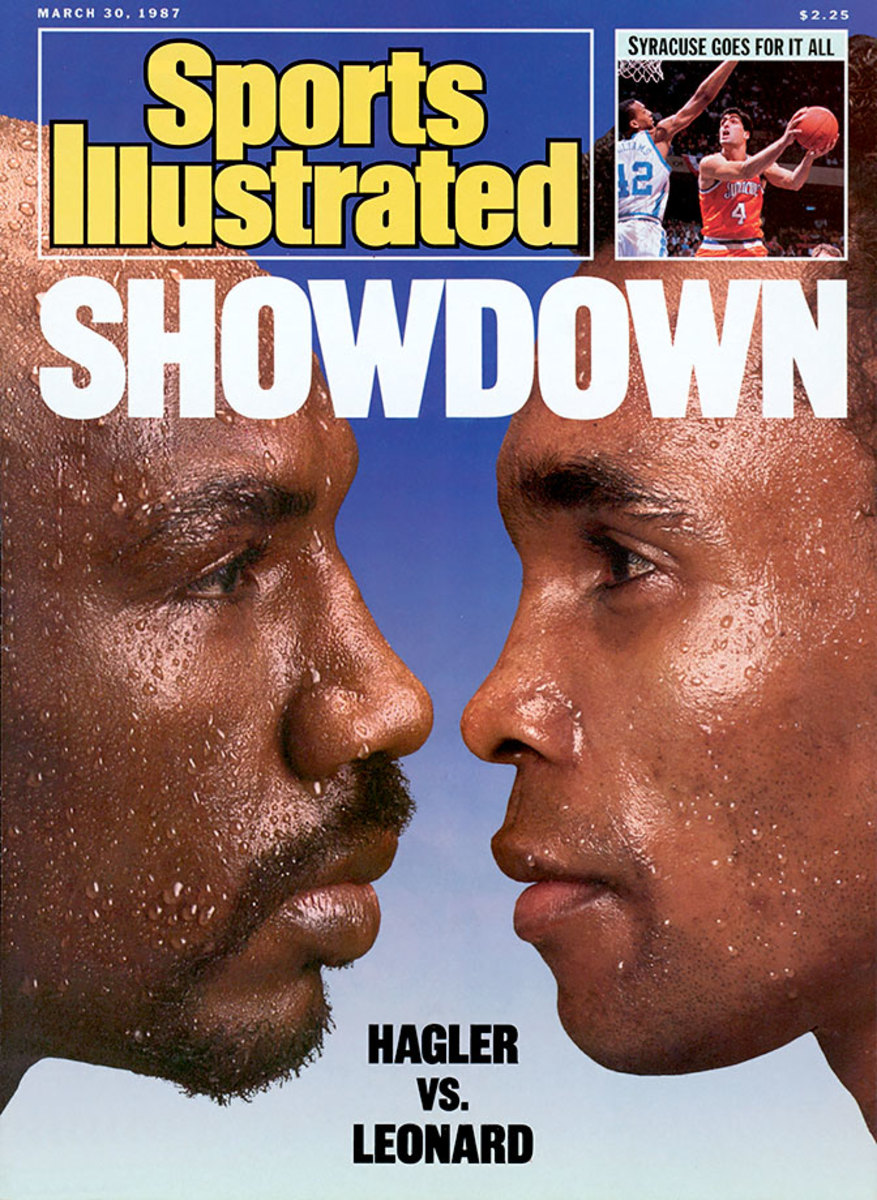'Hagler Did Things His Own Way': Remembering the Marvelous Marvin Hagler

Sugar Ray Leonard, five-division world champion, has waged wars, epic wars with the likes of Roberto Duran, Thomas Hearns and Donny Lalonde. Yet when Leonard thinks back on his Hall of Fame career, one fight, one beautifully brutal battle, stands out.
“Marvin Hagler,” Leonard told Sports Illustrated in a phone interview. “That was the closest I have come to death.”
For a boxer, compliments don’t get much better.
Hagler died on Saturday, his wife, Kay, announcing Hagler’s passing on Facebook. He was 66. Born in Newark, N.J., in 1954, Hagler’s family moved to Brockton, Mass., a blue collar suburb of Boston, in the late 60s. It was there he took up boxing, racking up a few amateur titles before turning pro in 1973. He claimed his first middleweight belt in 1980 and spent the better part of a decade as the dominant middleweight of his era. In 1987, Hagler lost a hotly disputed decision to Leonard. He never fought again.

The 1980s were a Golden Age for boxing, and Hagler was in the thick of it. A member of the Four Kings—joined by Leonard, Hearns and Duran—Hagler was involved in some of the most memorable fights in boxing history.
April 15, 1985: Hagler put his middleweight titles on the line against Hearns, then the 154-pound champion. Outdoors in Las Vegas, Hagler and Hearns engaged in one of the most memorable fights in middleweight history. The first round—a rock ‘em, sock ‘em robot affair—has been hailed as arguably the best fight in boxing history. In the third round, a Hagler right hand sent Hearns stumbling to the ropes. Another right hand finished him. The entire fight lasted eight minutes. It will be remembered for an eternity.
Hagler wanted to retire after beating Hearns. “He had saved all his money,” Bob Arum, Hagler’s longtime promoter, told Sports Illustrated. Arum recalled convincing Hagler to defend his titles again, a year later, against John Mugabi. Hagler struggled early before eventually stopping Mugabi in the 11th round. Leonard, who had been retired for two years, watched the fight from ringside.
Leonard wanted to fight Hagler. Years earlier, after losing to Hagler, Duran told Leonard he had the skills to outbox him. Hagler, Arum recalled, wanted nothing to do with it. Arum flew to Boston to meet with Pat Petronelli, Hagler’s co-manager. Together, Arum and Petronelli drove two hours to New Hampshire, where Hagler owned a house. When they arrived, Petronelli told Arum to wait in the car. From the front seat, Arum watched Petronelli and Hagler sit at a table in the front yard. Suddenly, Hagler began banging his fist on the table. Arum’s heart sank. When Petronelli returned to the car, Arum asked what happened. Petronelli explained that he offered to cut commission he and his brother, Goody, Hagler’s trainer, took from 33% to 15%. Hagler erupted.
“He said, ‘I don’t know if I’m going to fight that p----,’” Arum said. “But if I do you are taking your third.”
The bitterness Hagler felt for Leonard ran deep. “It was a class kind of thing,” Arum said. “Marvin was never an Olympian. He went into the pros and fought for $50 or $100 a fight. He had to fight the toughest guys. He had a hard time getting fights.” Arum said he only got involved with Hagler because in the late 1970s Ted Kennedy, then a U.S. Senator from Massachusetts, and Tip O’Neill, the Boston-born Speaker of the House, sent him letters threatening to open Congressional investigations if Arum, then a power broker in the 160-pound division, didn’t give Hagler a shot at the middleweight title.
Said Arum, “I wasn’t looking for trouble.”

Hagler and Leonard eventually agreed to fight in 1987. Stepping into the ring, Leonard admits he was nervous. “But I looked over at him,” says Leonard, “and I thought he was just as nervous.” Early in the first round, Leonard peppered Hagler with jabs. “And I could hear him,” says Leonard. “He just kept saying, ‘Fight like a man, you little [expletive].’”
For 12 rounds, the two stars battled. Leonard won the quicker exchanges, scoring and dipping out of trouble. Hagler won the toe-to-toe moments, burying Leonard with heavy combinations. “He hit like a heavyweight,” says Leonard. In the end, Leonard emerged with a split decision win—an outcome Hagler could never accept.
Leonard was willing to do it again. “He deserved a rematch,” Leonard said. Hagler wanted no part of it. In 1988, Arum, Hagler and Leonard were in Las Vegas for an event. Spotting Hagler, Leonard approached Arum. “He said, ‘Bob, go over and talk to Marvin, and tell him not to be a dope. Let’s do the rematch, we’ll make a lot of money,’” recalled Arum. Arum did. He told Hagler that Leonard really wanted it. He reminded him of the millions he could make for that fight. “He just looked at me in this really cold way,” says Arum. “And he said, ‘Bob, go tell Ray to get a life.’”
That was Hagler. “He was one of those rare fighters that could just walk away,” says Leonard. He moved to Italy and became immersed in the Italian film scene, appearing in several action movies. He was inducted into the Boxing Hall of Fame in 1993. He finished with a career record of 62-3-2 and never once seriously considered adding to it.
Could he have done more? Maybe. Hagler fought five times between 1984–87, his prime earning years. He never fought in any division but middleweight. But he didn’t care. “Hagler did things his own way,” Arum said. And his own way was enough.
